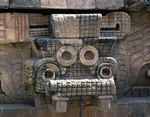There are numerous significant events that stand out from the era of discovery of the Americas. One event in particular is Hernando Cortés and his group of six hundred men conquering the Aztec Empire. One might ask how this conquest was possible? How was a small number of men able to conquer an entire empire? One factor that contributed to the Spanish conquest was the disease smallpox; however, there was another variable as well. The Aztec emperor Montezuma mistakenly believed Cortés to be Quetzalcoatl, an all powerful Aztec god who had promised one day to return to his people.1 So who was this supposed almighty god and why was Cortés believed to be him?

Quetzalcoatl, though most famously known for his relation to the Aztec religion, was actually acknowledged long before the Aztec civilization. Quetzalcoatl’s believers stretched all over Mesoamerica after the fall of Teotihuacan.2 Teotihuacan was a prehistoric city located in Central Mexico. The city arose around the first or second century BCE and fell around the 600s or 700s.3 The information regarding the civilization residing inside of Teotihuacan is still not fully known due to outside elements such as weather and other tribes who may have resided or passed through the area. The exact reason for the destruction of the city is still unknown. Although, archaeologists speculate the downfall was caused by a rapid decline in population.4 In accordance with Aztec legend, Quetzalcoatl had traveled from the east and elevated the Aztec empire by teaching them how to grow crops, develop architectural structures, and create tools with medal. He also helped construct the Aztec calendar. When an unknown rival tribe had surfaced, they drove Quetzalcoatl away. Before he left, Quetzalcoatl promised one day to return and save his oppressed people.5 Quetzalcoatl’s deity is represented as a feathered serpent.6 He was understood to be the god of learning and the patron of priests.7 Quetzalcoatl’s forthcoming was suspected to be around the same time as Cortés’ arrival.8

Scholars have attained an impressive amount of knowledge from ancient Aztec documents. According to their discoveries, the Aztecs proclaimed various omens of warning, which occurred just before the arrival of the conquistadors. Such omens included: an unusual amount of stars and comets in the sky, a sacred temple caught on fire, and the water on the lakes and rivers seeming to boil. All of these signs and the belief in the soon return of their god Quetzalcoatl, made it easy for the Aztecs to presume that Cortés was their long awaited god. Upon Cortés’ arrival, he was greeted with jewels and an assortment of gifts. When Cortés soon realized who the Aztecs deemed him to be and the influence his mistaken identity could produce, he was quick to use this opportunity to gain Montezuma’s trust, knowledge, resources, material objects, and even his fear. With their own emperor in a state of dismay, the rest of the Aztec people arose in a state of hysteria. This made it possible for Cortés and his men to manipulate the Aztecs, and profit from them what they wanted while they could. Eventually, Montezuma’s mistake led to the conquest of his entire empire.9
The Aztecs’ religious beliefs were fundamental attributes to their civilization. It was a unique quality which made them their own empire. In this particular circumstance, it was also a cause for their destruction. The Aztecs wholeheartedly believed their god Quetzalcoatl was partly responsible for the development of their civilization. Many Aztecs also truly believed Cortés was the return of their beloved god. Unfortunately for the Aztecs, their faith contributed to their conquest.
- Sara E. Cohen, “How the Aztecs Praised Montezuma,” Society for History Education 5, no. 3 (March 1972): 24-26. ↵
- Michael E. Smith, “Aztecs,” in The Oxford Handbook of the Archaeology of Ritual and Religion., by Rowan, Yorke M., ed. Timothy Insoll, vol. 77 (Arizona State Unversity, 2011), 563. ↵
- George L. Cowgill, “State and Society at Teotihuacan, Mexico,” Annual Review of Anthropology 26, no. 1 (October 1997): 129-130. ↵
- George L. Cowgill, “State and Society at Teotihuacan, Mexico,” 156. ↵
- Sara E. Cohen, “How the Aztecs Praised Montezuma,” 24-26. ↵
- Michael E. Smith, “Aztec Culture: An Overview” (Arizona State University, 2006), http://www.public.asu.edu/~mesmith9/1-CompleteSet/Smith-AztecCulture-WWW.pdf, 5. ↵
- Michael E. Smith, “Aztecs,” 563. ↵
- Sara E. Cohen, “How the Aztecs Praised Montezuma,” 24-26. ↵
- Sara E. Cohen, “How the Aztecs Praised Montezuma,” 24-26. ↵



65 comments
Bryan Martin Patino
I have always heard him been called Hernan, seeing his name as Hernando was a bit of an offset to me, and i feel like they could have tried to focus on the god more but it seemed like they were just trying to do a speed quick fire of everything that they could find that Quetzalcoatl had done for the aztec empire rather then expand on any of it.
Natalia Flores
Great job on the article! It’s interesting that this is one of the few articles on Aztec culture (if the only one currently), but great job. Though…I have to admit that this article lacks some information. Granted, I’ve been to the Templo Mayor in downtown Mexico city and visited some Aztec temples and a lot of my family is from Mexico. I’m surprised that this article didn’t mention La noche Triste where the Aztecs drove Cortez out of Tenochitlan.
Edgar Ramon
I have also heard this about Cortes being seen as Quetzalcoatl, and his horse having to do with him looking like a god too. If Quetzalcoatl was the god of learning then the Aztecs did end up learning much from the Spanish. I guess in that sense Cortes was sort of like Quetzalcoatl. However this article was lacking in detail, how the Aztecs were defeated, how they struggled.
Andrea Chavez
For my personal point of view this article was not very informative. But that might also have to do with the fact that I am from Mexico so my education is deep into everything Mexico. Plus my father really enjoyed teaching me about old civilizations. I have actually gone to the ruins so through the tour I’ve learned several things.
Cameron Ramirez
In high school, my Spanish class went over much of the history of the Aztec people. I have always found them to be so interesting and captivating. It is terrible that the Spanish explorers and Hernan Cortez took advantage of the Aztec people. I enjoyed reading your article because I have always liked reading about ancient civilizations. Overall, good work on your article on Quetzalcoatl and his influence on the Aztec Empire. Keep up the good work!
Osman Rodriguez
Great article! It is crazy to think how things happen for a reason. I believe if this certain event did not happen, the possibility that this world would be different, is very high. No one would like to be conquered, but without this happening, history would be completely different when it comes to the new world and Mexico. It is unfortunate that the Aztecs downfall came down to their faith.
Megan Barnett
I vaguely remember learning about this in high school, so I didn’t really comprehend who was who and what was going on through the article. I think you did a good job researching, but you included so much information that I could not keep up. This was a sad story for the Aztecs and shocking that Cortés took advantage of those innocent people.
Zeresh Haman
I love this article! I have always been interested in the Aztecs, and have heard about Quetzalcotal, but never really learned anything specifically about him. I find it really sad that the Aztecs demise in a way came from their own faith, but shame on Cortes for manipulating them into fully believing that he was Quetzalcotal. I think the story of the Aztecs is truly sad and unfortunate. I didn’t know that Quetzalcotal existed in other cultures, I thought he was strictly an Aztec god.
Alyssa Vela
This was a really informative article! Often in classes i’ve heard about the Aztecs, but i’ve never been interested enough to further my knowledge on the subject. I thought it was interesting how the downfall of the Aztecs was because of their beliefs in a god. I enjoyed that there was so much information, but you were able to weave everything together perfectly, so this didn’t cause any confusion. I look forward to reading more of your work in the future, great article!
Aimee Trevino
Great article! I had often heard of Quetzaltcoatl, but this article was a great refresher with so much more information. It is so interesting to see how his mistake in believing Hernan Cortes was Moctezuma led to the downfall of the Mayan Empire. I also think it is interesting how these Spaniards brought disease to the Mayan people, and that in itself was able to take a majority of the Mayans lives.